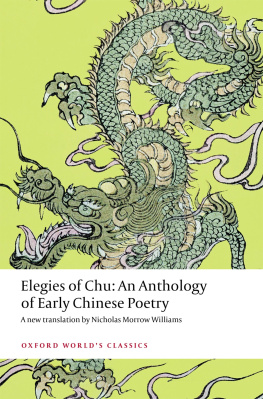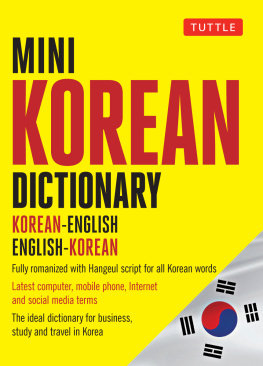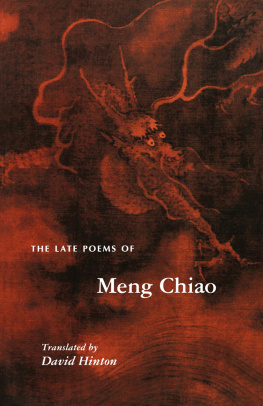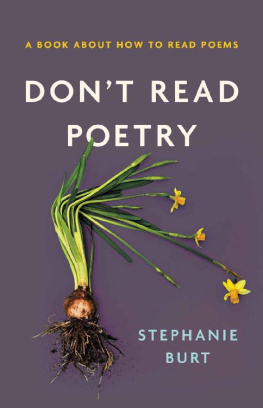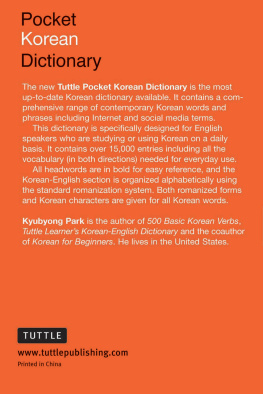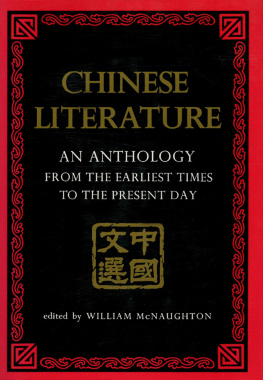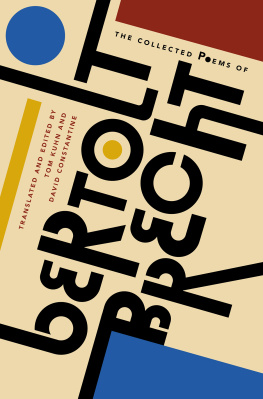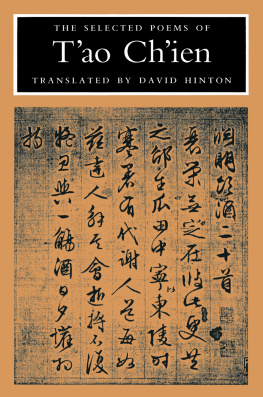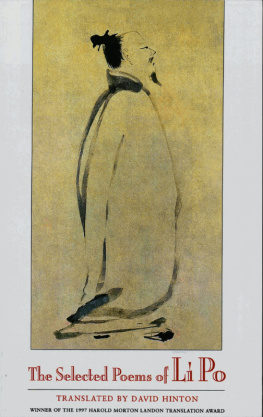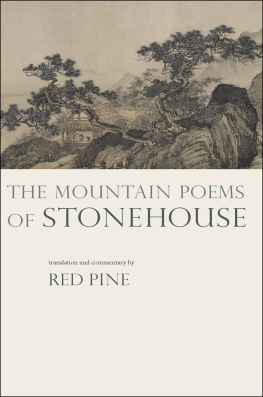ROUTLEDGE LIBRARY EDITIONS:
KOREAN STUDIES
Volume 5
POEMS FROM KOREA
POEMS FROM KOREA
From the Earliest Era to the Present
Edited by
PETER H. LEE
First published in 1964 by The John Day Company, Inc.
This revised edition first published in 1974 by George Allen & Unwin Ltd and The
University Press of Hawaii
This edition first published in 2020
by Routledge
2 Park Square, Milton Park, Abingdon, Oxon OX14 4RN
and by Routledge
52 Vanderbilt Avenue, New York, NY 10017
Routledge is an imprint of the Taylor & Francis Group, an informa business
1964, 1974 Unesco
UNESCO COLLECTION OF REPRESENTATIVE WORKS KOREAN SERIES
This book has been accepted in the Korean Series of the Translations Collection of the United Nations Educational, Scientific and Cultural Organization (UNESCO)
All rights reserved. No part of this book may be reprinted or reproduced or utilised in any form or by any electronic, mechanical, or other means, now known or hereafter invented, including photocopying and recording, or in any information storage or retrieval system, without permission in writing from the publishers.
Trademark notice: Product or corporate names may be trademarks or registered trademarks, and are used only for identification and explanation without intent to infringe.
British Library Cataloguing in Publication Data
A catalogue record for this book is available from the British Library
ISBN: 978-1-138-38774-4 (Set)
ISBN: 978-0-429-28646-9 (Set) (ebk)
ISBN: 978-0-367-27924-0 (Volume 5) (hbk)
ISBN: 978-0-429-29881-3 (Volume 5) (ebk)
Publishers Note
The publisher has gone to great lengths to ensure the quality of this reprint but points out that some imperfections in the original copies may be apparent.
Disclaimer
The publisher has made every effort to trace copyright holders and would welcome correspondence from those they have been unable to trace.
POEMS
FROM KOREA
FROM THE EARLIEST ERA
TO THE PRESENT
Compiled and translated by
PETER H. LEE
Foreword by Norman Holmes Pearson
First published in Great Britain in 1974
This book is copyright under the Berne Convention. All rights are reserved. Apart from any fair dealing for the purpose of private study, research, criticism or review, as permitted under the Copyright Act, 1956, no part of this publication may be reproduced, stored in a retrieval system, or transmitted, in any form or by any means, electronic, electrical, chemical, mechanical, optical, photocopying, recording or otherwise, without the prior permission of the copyright owner. Enquiries should be addressed to the publishers.
Unesco 1964, 1974
ISBN 0 04 808019 5
Originally published by The John Day Company, Inc., 1964. This revised edition first published by George Allen & Unwin Ltd and The University Press of Hawaii, 1974.
UNESCO COLLECTION OF REPRESENTATIVE WORKS KOREAN SERIES
This book
has been accepted
in the Korean Series
of the Translations Collection
of the United Nations
Educational, Scientific and
Cultural Organization
(UNESCO)
Printed in Great Britain
by Unwin Brothers Limited
The Gresham Press
Old Woking Surrey
To the memory of Wallace Stevens, 18791955
Oh! Blessed rage for order, pale Ramon,
The makers rage to order words of the sea,
Words of fragrant portals, dimly starred,
And of ourselves and of our origins,
In ghostlier demarcations, keener sounds.
THE IDEA OF ORDER AT KEY WEST
ACKNOWLEDGMENTS
I would like to thank Sir Maurice Bowra, Daniel L. Milton, Norman Holmes Pearson, and Rene Wellek for their kind encouragement; Donald Keene for reading the Introduction; and Denise Levertov for having read through the entire manuscript and making many useful suggestions.
Acknowledgments are due to the editors of the Beloit Poetry Journal, Monumenta Serica, Oriens Extremus, Orient/West (Tokyo), Poetry (Chicago), and Toung Pao for their permission to reprint groups of poems which first appeared in their journals; to the Istituto Italiano per il Medio ed Estremo Oriente for their permission to reprint all the twenty-five Old Korean poems which first appeared in my book, Studies in the Saenaennorae: Old Korean Poetry (Rome, 1959); and contemporary Korean authors for permission to translate their poems.
The excerpt from Wallace Stevens essay The Whole Man quoted in Dr. Pearsons Foreword is from Opus Posthumous (Alfred A. Knopf, Inc.) and his letters are quoted with the kind permission of Mrs. Holly Stevens.
CONTENTS
There is a good reason for Peter Hacksoo Lee to use a quotation from Wallace Stevens as the epigraph for his Anthology of Korean Poetry. Wallace Stevens was an older friend, and it was through Stevens that I first met him. Stevens wrote about Peter Lee in The Whole Man. Last week, he said in that essay, I received a letter, greetings on my seventy-fifth birthday, from a young scholar, a Korean. When he was at New Haven, he used to come up to Hartford and the two of us would go out to Elizabeth Park, in Hartford, and sit on a bench by the pond and talk about poetry. He did not wait for the ducks to bring him ideas but always had in mind questions that disclosed his familiarity with the experience of poetry. He spoke in the most natural English. He is now studying in Switzerland at Fribourg, from where his letter came. It was written in what appeared to be the most natural French. Apparently they prize all-round young men in Korea, too. In his letter, he said, Seventy-five years is not a great deal, when one thinks that the poets and philosophers of the Far East, nourishing themselves only on the mist, have been able to prolong life up to one hundred and even one hundred and fifty years. Historians tell us that they have then been able to enter into fairyland, which is beyond our comprehension today.
That is my idea of a specialist, Stevens went on to say, if these venerable men, by reducing themselves to skin and bones and by meditation prolonged year after year, could perceive final harmony in what all the world would concede to be final form, they would be supreme in lifes most magnificent adventure. But they would still be specialists.
Peter Lee is indeed an all-round man, as a poet and scholar who can recognize and transmit the moods and tones of the final harmony of specialists. He is fluent in Korean, Chinese, Japanese, English, French, German, and Italian. His doctorate was earned, in German, from the University of Munich. He is able to define the nature of Korean poetry by recognizing what it is like and what it is not like. He has models to watch, and the experience of poetry to guide him. These poems Stevens wrote about Lees poetry in 1954, are all singularly free from abstractions and perhaps that is why they are so moving and attractive. All poems touch one with the reality of their poetry. Stevens might also have said that they show, as successful poetry should show, the makers rage to order words of the sea. The sea of natural wonder is everywhere in them. The final form is evident. Stevens wrote me later that he would write an Introduction to a collection of Lees translations. When you get around to doing this book, let me know a few weeks in advance, if you can, because I like to have plenty of time for everything. But the manuscript never reached him; there was not time enough, and Peter Lee had more to learn.


